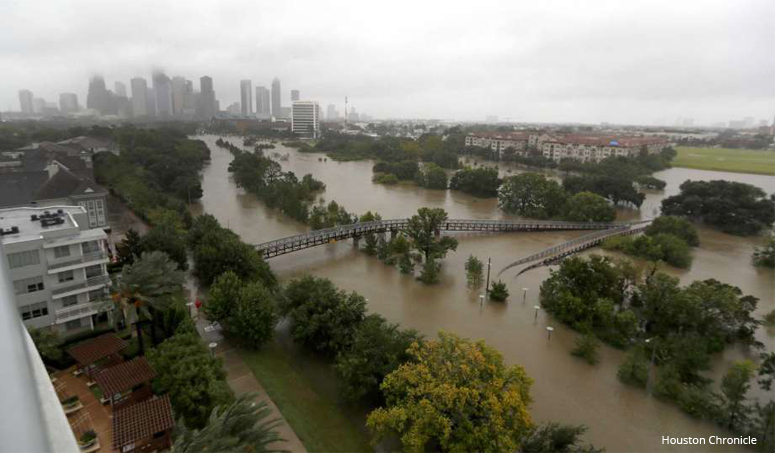Tens of thousands of Texas homeowners and business owners who have suffered billions of dollars in property damages from Hurricane Harvey may soon discover that a new state law eliminates long-time legal incentives for insurance companies to pay victims quickly and fully for their losses.
Corporate lawyers representing large Texas business say they are already getting calls worried that the new law may cause them significant troubles in the months to come.
Insurance industry advocates convinced Republican leaders in the Texas Legislature to pass a new law this year that makes it significantly more difficult for property owners to take legal action against insurance companies who make low-ball offers or delay payments – even in cases in which there is evidence that the insurance officials acted in bad faith.
Gov. Greg Abbott signed the legislation into law on May 26.
There is a small sliver of hope for the victims of Hurricane Harvey: the law does not go into effect until Sept. 1 – this Friday. Those who file their property damage claims by Thursday still follow under the older, more pro-consumer laws.

“The insurance companies wanted this law because it softens the hammer that homeowners have against insurance companies that decline to pay the full claim or do not pay claims in a timely manner,” says Dallas trial lawyer Andy Payne.
Insurance industry officials and pro-tort reform advocates, who seek to reduce or eliminate their economic exposure by limiting the rights of individuals and businesses to go to court when they’ve been damaged or defrauded, say the law was needed in order to curb lawsuit abuse.
The new law reduces penalties for insurance companies that offer too little money on storm claims. It also makes it harder for homeowners and business owners to get judges to order insurance companies to pay the lawyer fees of the homeowners, even when the evidence supports the homeowners’ claims.
“We are advising our corporate clients that if they have property affected by Hurricane Harvey, that they report the claim to their carriers before Friday,” says Haynes and Boone partner Ernest Martin Jr.
“Businesses with commercial buildings – apartment complexes, hotels, hospitals, convenience stores – are all potentially impacted by this law and they have lost a hammer that they once could have used against the insurance companies,” Martin says.
Martin and other lawyers agree that there are going to be many Texas businesses who will soon regret not standing up and opposing this law during the past legislative session.
“Designed to curb the exploitation of storm victims and insurance companies by the plaintiff’s bar, the new law significantly undercuts incentives for insurers to act responsibly, while making it more difficult for policyholders to hold insurers accountable for improper delays and failing to pay claims,” according to Dallas insurance law expert Amy Stewart, who issued a white paper on the new law Monday.
Stewart says the new law restricts a policyholders’ ability to sue its insurer in three ways.
“First, it requires pre-suit notice of any claim, with enhanced consequences for noncompliance,” she says. “Second, it limits a policyholder’s ability to bring suit against an insurer’s agent by allowing the insurer to elect to take responsibility for its agent.
“Finally, the law limits a policyholder’s ability to recover its attorney’s fees for prosecuting such a claim and reduces the interest recoverable in connection with delayed payments,” Stewart says.
Texas Department of Insurance data presented during legislative hearings showed that insurance companies take less time – or conduct no due diligence at all – in investigating claims before they close them.
Insurers had to re-open one out of every three claims they closed, lawyers stated.
Consumer advocacy group Texas Watch warned legislators that “many insurance companies will pay property owners as little and as late as possible.
“Texans can expect only more delays and denials from the for-profit insurance industry. The harmful effect of this legislation for homeowners, businesses, churches, and schools will be felt all across our state,” Texas Watch officials warned.
Houston lawyer Steve Mostyn said the law was written to “prevent consumers from holding their insurance companies accountable after natural disasters.”
“Texas has some of the most severe weather and some of the highest insurance rates in the nation,” says Mostyn. “We’re paying more for our insurance and getting less in return. We must hold insurance companies accountable so that after a storm or natural disaster, when people need the insurance they have paid for, the insurance companies actually do the job they were paid to do.”
